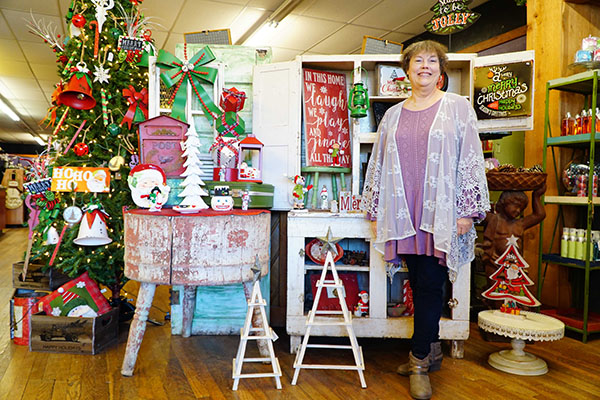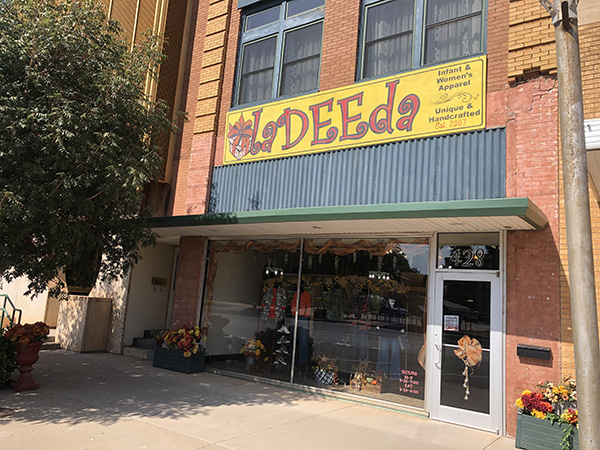Businesses battle economic fallout from COVID-19
By GEORGE SMITH, Student Reporter
The evening of March 24 became a long one when an Alva salon owner was called back to her shop after closing hours.
Jeena White, owner and operator of the salon Hair on the Square, spent the evening cutting hair for a few of her loyal patrons.
After she finished styling her customers’ hair and swept up the floor of the shop, she walked outside and locked the door. It remained locked for 30 days, just as Oklahoma Gov. Kevin Stitt’s executive order required all non-essential businesses in the state of Oklahoma to do.
“The worst part about closing was not knowing when we were going to be able to open back up,” White said, “whether it was just going to be 30 days, or if it was going to be longer.”
The sustainability of small businesses across the nation is reeling at the setbacks that the coronavirus pandemic has imposed on them. Businesses in rural areas with relatively low net incomes have been affected the most by health-related lockdown orders.
MILLIONS AFFECTED BY ECONOMIC DOWNTURN
In April, a survey from the Main Street America found that 7.5 million businesses may have to shut down if the economic effects of the pandemic don’t ease soon.

According to a July poll of small businesses conducted by MetLife and the U.S. Chamber of Commerce, 70% of small business owners say that, in the wake of overwhelming fixed costs and significant declines in sales, they won’t have enough money to cover the overhead costs of their businesses.
Around 60% of small business owners say they worry about having to permanently close because of these financial hardships.
However, the Alva community fared better when compared to the national averages for small businesses.
The reason small businesses in Oklahoma weren’t as heavily impacted by the pandemic is because of the looser constraints that Stitt’s executive order implied, said Geoff Clark, the CEO of Value Added Products in Alva.
“The fast reaction from our government and president saved a lot of businesses from going immediately under,” he said.
The week of March 15, VAP lost 80% of its business, Clark said. Because the company does so much business with schools and casinos that decided to shut down temporarily, major supply chains were sitting on millions of dollars’ worth of inventory that had no buyers. Clark decided to add to VAP’s market and sell to those businesses not impacted by pandemics – businesses such as retailers, where demand stays relatively constant, he said.
“The demand of food has not been crucially impacted,” Clark said. “The country’s dependence on retailers to sell groceries is still readily marketable.”
VAP is a cooperative of almost 900 farmers in the region who sell their goods directly to VAP. The company buys grain from local farmers and uses it to make products such as pizza dough.
Referenced in a CNBC video, Paychex CEO Martin Mucci said that, although the demand for products will rise as businesses begin to reopen, the supply may not be able to cope with the rapid increase because of shortages in the supply chain.
Janie Gould, manager of Merrifield’s Office Supplies, said: “In my 28 years of work, I have never had back orders. Now, I have back orders on items that I typically keep stocked on the shelves.”
IN-PERSON SALES CRUCIAL FOR SMALL BUSINESSES
For the boutique businesses located around the downtown square, Erica Kraft, owner and operator of Wicked Threads, said an often overlooked aspect of small retail businesses in Alva is the amount of foot traffic needed to sustain the business. With the cancellation of fall sporting events at Northwestern, the decline in foot traffic will have an impact on sales at retail stores all around downtown.
La-Dee-Da owner and operator Dee Wiebener said her business will sometimes make enough sales during a Saturday home football game at the university that her store can net a profit for the whole week in one day.

Wiebener also said she was able to make some online sales during the 30-day shutdown, but the in-person sales are what keep her business afloat.
West of La-Dee-Da, the Copper Penny, owned and operated by Kim Foster, makes 100% of its profit through merchandise bought in-store.
Some businesses in the community used a hybrid format to stay open during the 30-day lockdown.
The Alva Golf and Country Club closed its cafeteria, yet it maintained membership and course sales, which helped the organization stay afloat, said Jennifer Taylor, the new general manager of the clubhouse.
“The people who come to golf at Alva still came to golf even though we weren’t serving food or allowing people into the clubhouse,” she said.
NOT ALL JOBS AFFECTED
The Farmers Cooperative Association used its storefront lobby on the corner of 4th and Barnes streets as a curbside pick-up spot. The Co-op only took call-in orders and window orders for customers to grab supplies and tools needed for their farms or other projects or businesses.
Because no customers were allowed inside the store lobby, the store’s manager, Rick Rhodes, decided that the time to rearrange the store was better than ever.
“We decided to take advantage of the shut-down and reset the gondolas in the store so that, as you walk in, you’re able to see down the aisles,” Rhodes explained.
In general, Rhodes said sales were relatively unaffected by closing the lobby to passersby.
“I’m sure some sales were lost because people couldn’t come in and browse our selection of merchandise,” he said. “We did allow people to come and browse our gardening selection outside. We just wanted to get the floors sealed before we let people back into the lobby. Normally, farmers break something and need a replacement for it, like, yesterday, so our job turned into a marathon of running back and forth to customers outside, fixing them up with the right part.”
Preston Lowe, assistant production manager for both sets of the Co-op’s elevators, said his job was not affected by the shutdown at all.
“Farmers were cutting wheat, and we were going to have to take it one way or another,” Lowe said.
The various eating establishments in Alva stayed relatively consistent with sales.
Sonic’s general manager, Karen Adams, said Sonic was able to stay open with relatively no format changes.
Some items on the menu became unavailable because of supply chain shortages.
McDonald’s decided to require customers and employees to wear masks inside the building, according to shift manager Trevor Pharris.
The drive-thru stayed open, and the restaurant reduced its hours of operation to give staff more time to clean.
Gambino’s Pizza closed its dining room and discontinued its buffet for a short while, yet it stayed open for takeout orders, said Christy Villanueva, the restaurant’s general manager.
“Having the buffet closed was where we lost the most money,” she said. “A lot of our profits come from having it open.”
El Maya started a take-out only response, but it had to close for the 30-day mandatory shutdown just a few days later.
The restaurant reopened and accommodated half of its full dining capacity to comply with social distancing rules.
The medicinal marijuana dispensary Joint Pains stayed open at both its Alva and Waynoka locations.
The medicinal dispensaries are considered essential businesses along with drug stores and pharmacies.
Averages for unemployment throughout the United States, according to the U.S. Bureau of Labor Statistics, imply that the South is handling the pandemic better economically.
Paychex’s Mucci said the South is still No. 1 in job growth, and the construction industry is a major employer.
